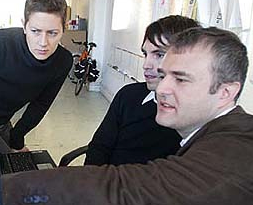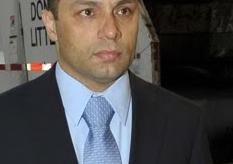Inside Gawker Media's First Company-Wide Meeting

Last night, Gawker Media held its first real company-wide meeting at the Crosby Hotel screening room, down in the hotel’s swank basement. Honcho Nick Denton gave a speech from the stage — just like a real grown-up company, and also totally not.
“His pep talk amounted to showing a chart of upward linear growth and telling us it wasn’t good enough,” said one employee. “But what do you expect from Nick — is he going to go around and rub everybody’s shoulders?”
No. He is not. Denton should feel good that he came off as a real hardass. Everyone knows where they stand now: grow (more!) or get out. And another principle he issued was that Gawker Media is to be considered a tech company — but it should also be considered a tech company with editorial products… that should soon just happen to get more traffic than the New York Times website or the Huffington Post. Gawker Media, of course, is essentially supposed to be the next Facebook. Along the way to that goal, there’ll be some big news announced by the company. (But not yet.)
So one highlight of the meeting was a top site editor taking issue with the conception of the company as a tech company. (Tech companies sell for a greater revenue multiplier than “editorial” companies do, although Denton also announced the company was absolutely not for sale.) Gawker Media’s tech build-up includes what is said to be a very intense commenter system. (What was your top takeaway from the evening? I asked one writer. “Soon writers will be obsolete,” the writer told me. “Reddit?” said another. To be fair, that’s a common refrain over the years at Gawker, but it is an ideal outcome for a tech company. Gawker Media loves talent, but they also know there’s always more talent.) In any event, Denton did not relent to the editor’s insistence that the company was an editorial property.
Nor did anyone explain what this new commenter system is like. It runs apparently on magic, and will increase pageviews magically. With Gawker Media’s history of smooth product rollouts, we’re sure it’ll work splendidly right out of the gate! Speaking of! Nick was asked if he would do the infamous redesign differently if he could do it over again. “No,” he said — saying that, what’s the point in having an independent company if you can’t do things that are radical and make screw-ups? (While the company’s competitors are, he said, hide-bound and risk-averse. That is true.)
Attendees described the meeting as alternately hilarious, exciting, boring and frightening. Looming over it all is the matter of pageviews, as there always is. Money is not just being spent on tech development, but on beefing up website staff — something of a hiring spree is at hand, because each site is expected to grow quite incredibly over the next year.
Andrew Gorenstein, the new head of ad sales, recently taken from Condé Nast, came off impressively, even from editorial, who is always expected to hate the ad guys. (That is a new and weird thing.)
There was a grab-bag of anonymous questions from the staff, which were presented all at once, and were slightly distorted in the reading. (One question, which went in as essentially “Will there be a future system for annual raises?” was asked as “When will I get a raise?” To which Denton responded, “You’ll get a raise when you’re promoted.”) This is a strangeness of the company, even as it has maternity leave, good pay and retirement plans: there is, with some exceptions, not so much promotion from within. People in senior editorial positions who have held lower positions generally achieved their new promotions by leaving the company and then returning. The other way to get promoted is to, essentially, hire a department under you — a sort of Amway situation.
There was, however, a highly enjoyable historical montage of photographs from throughout the enterprise’s already-storied history. Now everyone just has to go out and get more traffic. (Because it’s not like they weren’t already trying to do that.) But good news: there are chefs cooking sushi in the office today. Stuff your pockets with raw fish on your way home.
I have an insane number of both conflicting and mutual interests with Gawker Media. None of the above is based on information provided by the company.
Yes, Let's Teach Robots To Think For Themselves
“You’ve heard it before: robots are bad at new things. They’re bad at adapting to new situations, they’re bad at recognizing new objects, and they’re bad at coming up with their own ideas about how to carry out tasks in changing environments. One way to deal with this general ineptitude is to provide a robot with endlessly detailed instructions to minimize the amount of unfamiliar things it experiences. The world is an awfully big place, however, and if we want robots to be able to do robot stuff outside of tolerably controlled environments, such a brute force approach may not be the best way to go. A much more elegant solution is to teach robots to think and adapt for themselves.”
— Yeah, that’s a terrific idea! I can’t think of anything to worry about on this score. Let’s get busy making robots that are self-aware! [Via]
A Conversation With Chad Harbach, Author Of "The Art Of Fielding"
A Conversation With Chad Harbach, Author Of “The Art Of Fielding”
by Corban Goble

It seems like Chad Harbach is everywhere right now. His debut novel, The Art of Fielding (the advance for which you probably heard about) is getting great reviews — as well it should. The book, about a college baseball phenom and his season, is a singular, smart, endlessly charming read. I talked with the author and N+1 editor earlier this week; Harbach being a Wisconsin native, we met up at the famously Packers/Brewers/Badgers-centric bar Kettle of Fish in the West Village.
Corban Goble: You got $650,000 for the book. What was the first thing you did?
Chad Harbach: I paid back a lot of the people to whom I owed a lot of money. By the time I actually got paid it had been a full year since I had had a job.
Who’s the first person you paid back?
Keith Gessen.
Over the course of writing the book, what was the oddest thing you had to research?
Well, I didn’t do that much research. I had a fairly strange job when I was in grad school. Just as I was finishing grad school I got a job tutoring for this billionaire family that lives in Virginia, where I was living. They go down to Florida for the Winter Equestrian Festival and their youngest daughter, who was in high school, was a very serious equestrienne. So she was leaving school for three months. So I went down to Florida and hung out for three months in this very strange community. It’s people from around the world: all of the equestrian people and all of the polo people all go hang out together for three months. All of the locals clear out and rent out their houses. I was there when these northern, small-college baseball teams go down to Florida for their spring training. They go play a dozen games. So I drove around and watched some of those games. That was really the only thing that I did, as a direct piece of research.
Did you have to cut anything from the book you loved?
Nobody made me cut anything out of the book. I wrote, all told, thousands upon thousands of pages. And I’m sure some of what I cut was the wrong stuff. My editor wasn’t like, “This has to go.”
Where in Wisconsin are you from?
Racine.
Do you have a favorite Packers player?
Donald Driver is my favorite Packer because he’s both the coolest guy and a link to the olden days.
I refuse to ever fall out of love with Brett Favre. A lot of Wisconsinites have turned on him at one point or the other. But when he had that great season for the Vikings, I was pretty pumped about that actually. I think of rooting for the Packers for the last 20 years, and he just made that experience for so many people. So much of the crazy shit he did at the end doesn’t diminish the amazing stuff that he did.
Worked out for the Packers, though.
They look like geniuses now.
What’s the most Wisconsin-y thing you did growing up? Did you play hockey?
There was really no hockey where I was growing up. It’s really almost all basketball.
Isn’t Nick Van Exel from Racine?
Nick Van Exel is from Kenosha. I went to Catholic high school and Nick Van Exel went to the Catholic high school in Kenosha. I think he was senior in high school when I was in eighth grade, so he was a little before my time. Having my entire adolescence consumed by sports, that was the primary Wisconsin thing.
Were you good at sports?
I was a good high-school athlete. I was the youngest person in my class, small and scrawny, so I wasn’t cut out to go past that. But I did pretty well.
What did you play?
Baseball, basketball and golf.
What’s your relationship with Herman Melville? There are tons of Melville allusions and references in The Art of Fielding.
I’m not constantly obsessed with Melville. But certainly when I was in college I took a seminar entirely devoted to Melville and that’s when I read Moby-Dick as well as almost everything else he ever wrote. That was a really formative literary experience for me. Because this book that I had heard talked about for so long in this very reverential and kind of scary way turned out to be this brash, beautiful, musical book that was very funny and very engaging. It’s not like I sit around and read a Melville book once a week or anything.
What are you reading right now?
I’m reading Siddhartha Deb’s book The Beautiful and the Damned. It’s about contemporary India and the influx of capital in India and the way that India’s changed in the last couple of years. One chapter of the book was published in n+1 and I edited that essay. So now I’m reading Sid’s book, which I’m enjoying. I haven’t read a whole helluva lot of books though, unfortunately.
What do you read on the Internet?
I need someone to tell me where to go on the Internet. Most of the things that I read on the Internet come from… I go to the place where n+1 tracks its stats and its viewers and I follow those links and they lead me around. Statcounter is my go-to.
What do you like about New York?
I like New York because you’re always so confident that there’s a ton of shit going on and you can stay at home and work and not feel anxious about it. I think when I’m in other places, I’m like, why am I here by myself?
What NYC neighborhoods do you like?
I lived in Prospect Heights the whole time I was here. Which I liked an awful lot, and it changed an awful lot, even just during the course of the time that I lived there. I went to a party in Williamsburg the other weekend and it just blew my fucking mind. I was just like, man, it’s like high school and then stage two, post-high school and then stage three, post-post-high school — and then there are some 50-year-old dudes hanging around.
What’s your favorite brand of jeans?
When I was poor, very poor, I discovered Penguin jeans. Which is maybe a non-intuitive brand of jean. But they fit a human being perfectly. I’m wearing them right now.
People have compared to book to Jonathan Franzen’s Freedom as well as to Franzen’s work overall. What do you think about that?
There’s a quote from Franzen on the cover of the book, which gives people a real way in to saying things like that. I don’t know. I’ve read all of his work and I admire it greatly. If there was a book that would have influenced me it would have been The Corrections, because I liked The Corrections more than I liked his first two books. I’ve read some reviews that compare a certain scene in my book to a certain scene in Freedom, but of course I wrote that scene four years before I read Freedom. He’s certainly a guy from the Midwest who found a very immediate-feeling way of writing about that experience.
What don’t you like that he’s written?
My least favorite of his books is Strong Motion. You can probably point to some parts of Strong Motion that I don’t like, but Freedom and The Corrections are two of my favorite books in recent history.
I really want to read The Art of Fielding by Aparicio Rodriguez — the small volume of aphorisms to which your protag Henry is always referring.
That whole Aparicio Rodriguez thing wasn’t really a part of my very first conception of the book, it kind of sprang up along the way. I wrote the first couple of those mantras and I had so much fun writing them that I almost felt like it was off-limits, that I shouldn’t be having quite so much fun. But then, eventually, a few people started to read the book and they were like, “I really love those.” So I was like, yeah, I can do a few more. But I hadn’t written all 233 of them.
Did you have anyone in mind for the character? Because Aparicio Rodriguez played for the Cardinals, I can’t help but think Ozzie Smith.
Certainly, in an on-the-field way. I don’t know the first thing about Ozzie Smith’s personality, so it has nothing to do with that. When I was a little kid, the greatest defensive baseball player was Ozzie Smith. He would do things that were absolutely insane on the baseball field and make it look poetic. He’s the most direct model.
What do your parents think?
My family… It’s complex. First of all, my parents were baffled about the fact that I went to Harvard and accomplished nothing and earned no money for, like, 13 years thereafter. I think they were utterly perplexed by what I was up to. So I think their primary emotion just might be relief. I think they’re into it. I’m having a book party coming up here, and it’s induced my parents to make their first-ever trip to New York. So that’s going to be serious.
What’s your favorite tool of procrastination?
I blocked all chess sites from my computer. I find that my addictive tendencies tend toward games. The Internet is so dangerous. If I ever allowed myself to start playing chess or poker on the Internet I would just never emerge again.
Do you play video games?
I don’t play video-video games. When I was in college, there was a really gripping computer game called Maelstrom, which was basically an early PC version of Asteroids. Me and my friends in college, we would play Maelstrom. But I became so intensely addicted to it that I… For one thing the game started taking two hours. And then I posted a Maelstrom score that… I might have been the best Maelstrom player in the country. Luckily, I’ve never gotten into the actual video games at all. I tend to go for a really simple sort of game, and I think the sheer realness of those games put me off.
I can see chess getting addictive.
But it’s weirdly two-dimensional and depressing. Which is what I like about it.
What are you doing this weekend?
I’m going to a wedding.
Where is it?
It’s on a farm in the Hudson Valley. That’s what I have going on.
Have you been following the Brewers at all?
Sure. They were on the cover of Sports Illustrated a couple of weeks ago.
That’s the same issue that they published an excerpt of your book in! That’s pretty weird.
Yeah, that was the issue. I would have bought that issue anyway because the Brewers were on the cover. I don’t read SI very regularly but I subscribed to it as a kid. Obviously, Bill Simmons has been one of the transformative figures of the Internet.
What do you think of Bill Simmons?
I think he’s a super-genius. I think he’s one of those supergenii who has an immense number of imitators who are all awful.
Do you read Grantland?
Grantland is kind of finding its way, but it’s done some good stuff. Grantland is bad when it involves Bill Simmons imitations.
What do you think about the prospects of The Classical?
I hope The Classical does awesome. What’s not being done is really serious, and really rigorous approach to sports. What Grantland is not doing is thinking about the role that sports plays in American society and culture. At n+1 we try to do that every once in a while, but we don’t do sports that often so it’s a little erratic. So I hope the Classical does some of that. Just deep thinking about the way that sports fit in. Because I think Grantland is a level more superficial than that.
Corban Goble is from Kansas but lives in New York now.
How You Can Fund Legal Representation for Women in Crisis

Do you like stairs and hate domestic violence? Great news! On the evening of October 6th, you have the opportunity in New York City to climb 42 flights of stairs as a fundraiser for inMotion, which provides free legal services for women, particularly women who are in the process of extricating themselves from abusive relationships. There will be rest areas on these stairs! But don’t be too alarmed: you can sign up for 14 floors or even zero floors. Why not register now, as a team member or an individual? WHY NOT, I SAID? Do you want women to be in legal battles with abusers and stalkers over children and property without excellent representation? Do you?
Report: Some Schmuck With A Twitter Account Is Today's Don Draper
“Social media managers are the new Mad Men, making creative content to convince their audiences to spend, spend, spend.”
Dumb Word Game on Twitter That Cracks Me Up
Is it cool to support a buddy’s drinking habit by always making a small container of alcohol available to him? Flasking for a friend.less than a minute ago via web
James Urbaniak
JamesUrbaniak
@JamesUrbaniak Should I wall the fiend up in a wall, knowing he’ll never escape, for the injustice he did to me? Casking for a friendThu Sep 08 05:31:54 via web
John Leavitt
LeavittAlone
Is it okay to put tape over the brand names of expensive appliances in order to make guests feel less class-conscious? Masking for a friend.less than a minute ago via web
James Urbaniak
JamesUrbaniak
@JamesUrbaniak Is it possible to secede from Spain and form an autonomous region in the north? Basquing for a friend.Thu Sep 08 05:51:10 via web
Christopher Cooper
ARTofCOOP
@JamesUrbaniak is it okay to absorb vitamin d by laying on a sun-warmed rock?Thu Sep 08 05:32:49 via Twitter for iPhone
Julieanne Smolinski
BoobsRadley
Consider The Waveform
“What visual sign says ‘music’? Notes remain the most typical answer — particularly, it seems, beamed eighth or quarter notes (see the iTunes icon); the solitary eighth note with its jaunty flag; and the clef. The disc shape has had a pretty good run, and you still see instances involving headphones (Napster’s logo, for instance). Maybe representations of speakers and guitars would make the list, too. But if you want to suggest music in the digital era, how about the waveform?”
— Well? How about it?
Ifttt: Pretty Much the Greatest Thing Ever

Ifttt is pretty close to being the greatest thing in the world. Go explore the preset recipes or make your own.
Wardell Quezergue, 1930-2011
“Wardell Quezergue Sr., the bandleader, producer, composer, arranger and educator whose contributions to a plethora of New Orleans rhythm & blues classics earned him the moniker “the Creole Beethoven,” died Tuesday morning at East Jefferson Hospital of congestive heart failure. He was 81. As an arranger and, occasionally, as a producer, Mr. Quezergue (pronounced ka-ZAIR) dressed up recordings with horns and other embellishments. His credits include Jean Knight’s smash ‘Mr. Big Stuff,’ the Dixie Cups’ ‘Iko Iko’ and ‘Chapel of Love,’ Professor Longhair’s recording of ‘Big Chief,’ Robert Parker’s ‘Barefootin,’ King Floyd’s ‘Groove Me,’ Dorothy Moore’s ‘Misty Blue’ and Dr. John’s landmark 1992 album ‘Goin’ Back to New Orleans.’”
— When the first two paragraphs of your obituary read like the tracklist for one of the best mixtapes ever you’ve done pretty well.
The "Rape-Cop Juror" Tell-All

So we all had a Big Bunch of Feelings about the NYPD rape trial of the summer. And now, in a really pretty incredible move, one of the jurors has written a very serious account of what it was like to serve. Back in June, Patrick Kirkland wrote on his blog: “Over the last three months, I’ve been unable to talk about a major part of my life. No, it’s not because I didn’t know how to, or I didn’t know what to say, but because, by law, I couldn’t. As a writer, I was told specifically not to write about them. Not to document it, not to research it. Nothing. Because over the last three months, I’ve been a juror on a major criminal case in New York City.”
And now, over at Gothamist, he has. At length. (The PDF is $1.99; on Amazon, for Kindle, it’s $2.99.) It’s a fascinating read, and I mean that in a very honest sense. In large part it’s about how unbelievably important jury service is in America, and about how we treat those accused of crimes. Whether you like the verdict or not, or whether you like the case presented by prosecutors or not (SIGH), this view into the thinking and process of the jurors is really valuable. It also may upset you!
